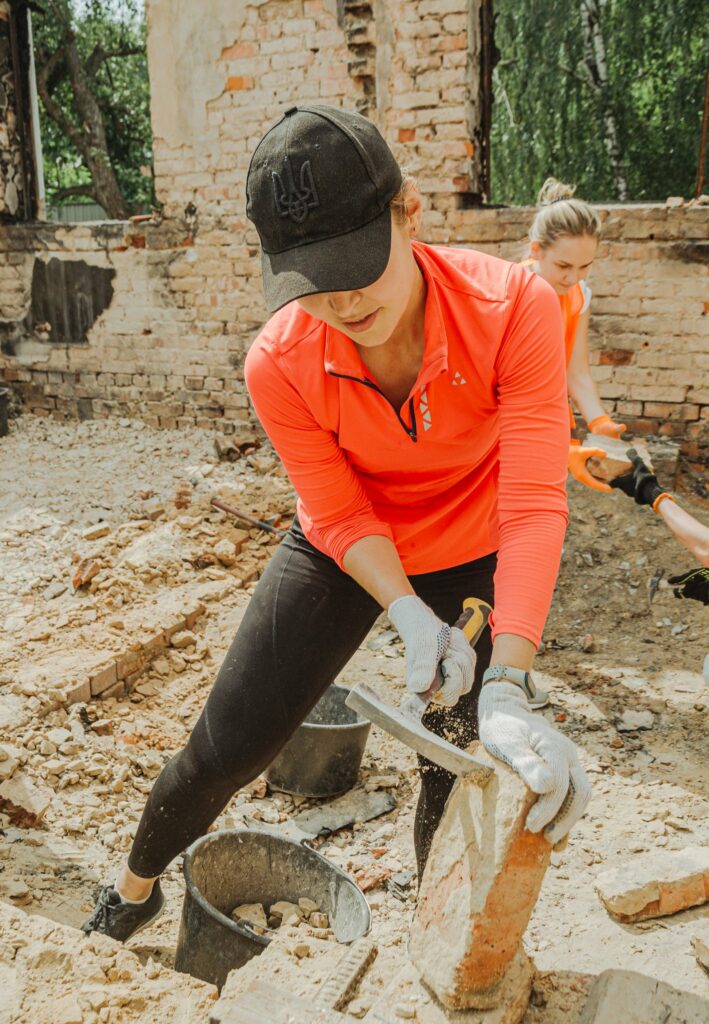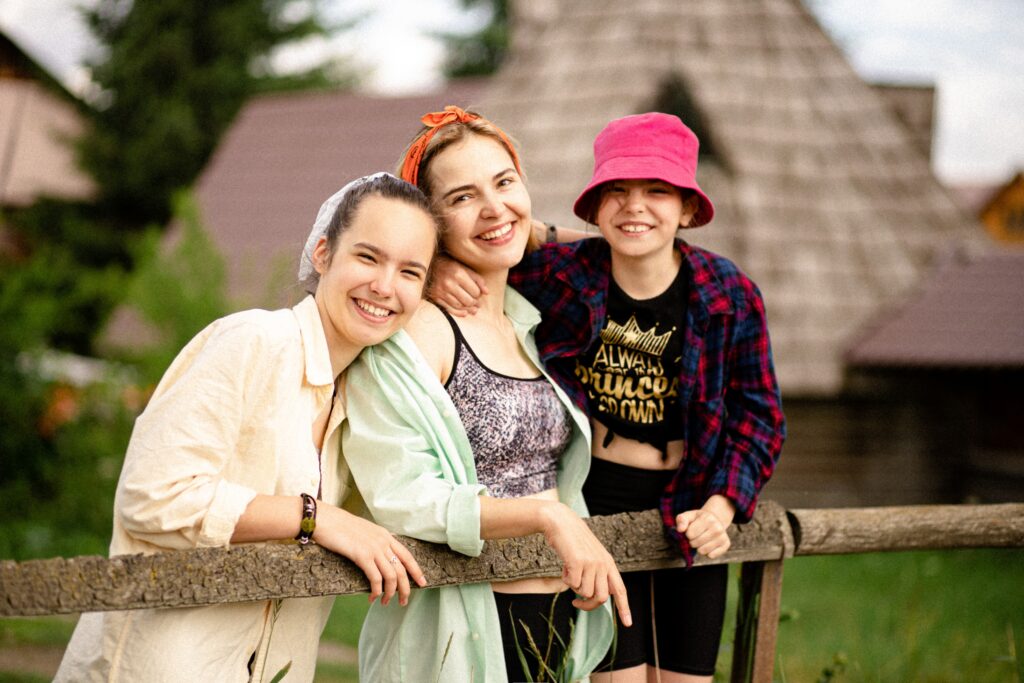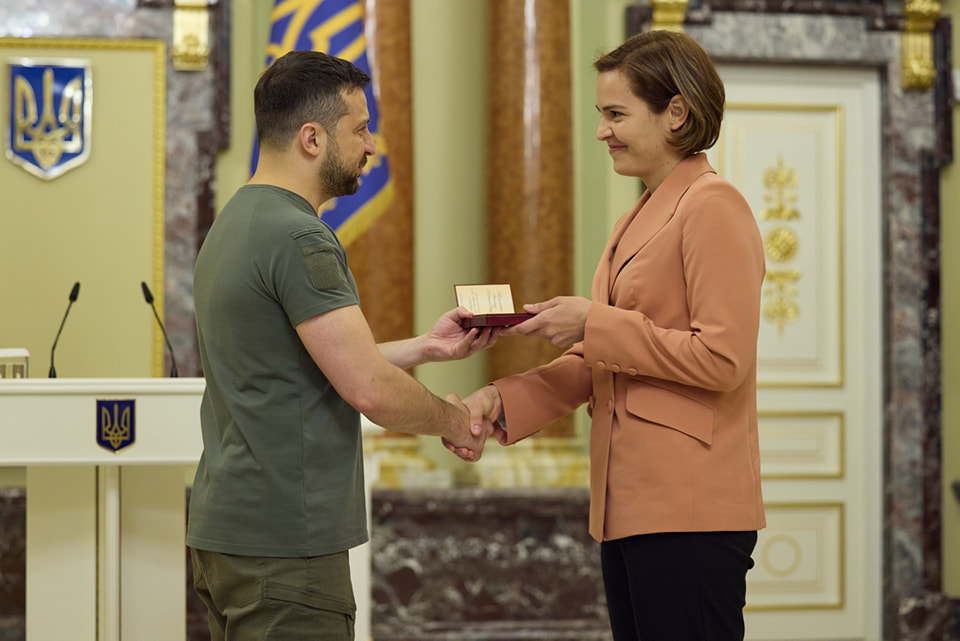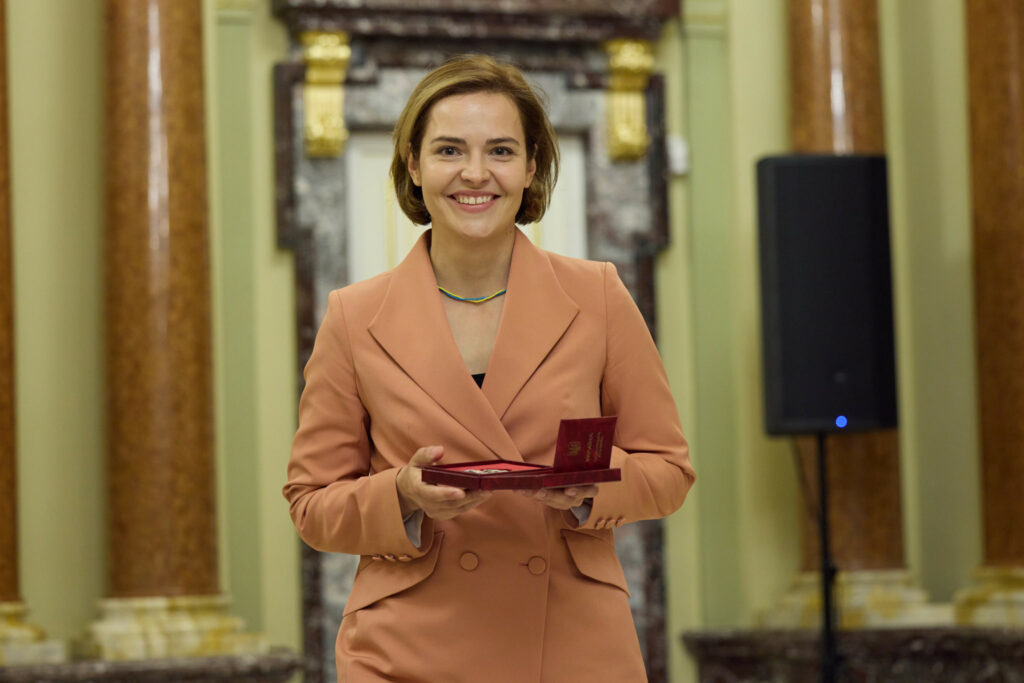CHERNIHIV JOURNALIST ALINA KLYMENKO WAS THE FIRST TO INFORM ON A BREAD LINE MASSACRE
Every war is also a war for the truth, for the possibility to inform peaceful people about things they cannot see through the dry lines of official sources. That’s why, journalists are often hunted. According to Colonel Taras Hren, a special correspondent of ArmyInform, Information Agency at the Ministry of Defense of Ukraine, journalists do become target number one. If russian servicemen see members of the mass media, they are fired upon. Blue helmets and flak jackets with PRESS written on them do not save in those cases. As a result, the death toll of media workers is increasing. In only four months since the start of the full-scale invasion, Ukraine has lost 32 journalists. In eight years, even more journalists have laid down their lives. Such is the bitter price of truth.
Alina Klymenko, a correspondent and anchorperson at Suspilne Chernihiv, was in Chernihiv when the city was sieged and shelled by russian troops. From the first days of the war, despite the danger, she filmed everything and to this day documents the atrocities committed by the occupiers. But for Alina, the bread line massacre in one of the residential areas (with 14 Chernihiv civilians killed) would have remained a point in the general statistics of casualties.
For significant merits in the strengthening of Ukrainian statehood, courage and self-sacrifice in defending the sovereignty and territorial integrity of Ukraine, notable personal contribution to the development of various spheres of public life, defense of the national interests of our state, conscientious performance of professional duty, Alina was awarded the Order of Princess Olha, Class III.
“WE DO EVERYTHING FOR UKRAINE”
According to the journalist, she realized the significance and importance of the award only after it was given to her by the President of Ukraine Volodymyr Zelenskyi and his heartwarming “Thank you, Alina!”
“I share the award with the people who are always behind the scenes. These are cameramen. Oleksandr Polishchuk and I worked without flak jackets and helmets during active hostilities. But he never once said: “I won’t go there.” Cameramen will follow you silently and film with shells whizzing overhead. We filmed people in Chernihiv trying to charge their mobiles in the open air from generators, building wooden toilets in the yards of high-rise buildings. At that moment, artillery shells were falling somewhere very close by. You can hear it on the video. The war is not over. We are not going to relax, ‘decorated with orders.’ We do everything for Ukraine,” Alina wrote on her FB page on returning from the capital.
No one would have condemned the mother of two underage daughters if she had left Chernihiv right after russia’s full-scale invasion. But professional duty outweighed her anxiety for the kids and her kith and kins’ advice to save both herself and the girls.
“I wanted to be in the thick of everything, to see everything with my own eyes, to tell the world the truth about the war, about crimes against civilians. I realize how little I managed to do,” the journalist says. “When during the hostilities in Chernihiv electricity, all communications and the Internet disappeared, the only thing I lacked was information. Information turned out to be more important than comfort, money and even food. So I tried to record everything for the world to see what was really happening.”
The shelling took place on March 16 near the journalist’s house. Her father, who was lucky to survive, was in the line. She learned about the tragedy from him. In a few minutes, she ran to the scene. She didn’t have a press card, because she mostly worked in a studio and didn’t carry her ID card with her. She managed to take two shots when they threatened to shoot her phone if she continued filming.
She ran without a flak jacket and helmet. Without fear. With awareness that the world must see the truth. And the world did see it. It was the first such obvious and cruel proof of russia’s war crimes.
It was not easy to transmit the footage from Chernihiv because of communication problems. When she succeeded, the event gained publicity, the information reached the office of the President of the United States.
“That work and the videos filmed in Chernihiv at that time definitely had an impact on the support of Ukraine in the world,” says Alla Skoryk, chief news editor at Suspilne Chernihiv.
Later, Alina will edit a video with footage of the bombed-out Chernihiv, based on her historical photos.
THE TRUTH ABOUT WAR
Alina Klymenko has always looked harmonious and charismatic on camera (owing to the announcer’s degree gained at the Kyiv National Karpenko-Kary Theater, Cinema and Television University). So the people of Chernihiv enjoyed watching her programs and reports.
She dreamed of becoming an actress, but that was not to be. She graduated from the conducting faculty of Levko Revutsky Chernihiv Music School, but music remained her hobby. Alina was fascinated by journalism: TV and radio agency Novyi Chernihiv, media group CheLine, and Suspilne for the fifth year.
“Television is not only work for me, but also an opportunity for self-realization,” Alina said. “The war revealed my new: audacity, courage and fearlessness. When I ran without protective equipment to film the tragedy, I thought neither about the danger nor about my kids.”
Each of Alina’s video plots is painful, insightful, impressive and objective. Victims of sexual violence and children who have lost their parents confide their stories in her. She is able to ask her heroes even about things they don’t want to recall. Because mankind must know and remember the russian army’s atrocities, civilian casualties, the scale of destruction and the number of innocent victims.
“I want to shield all Ukrainian children from grief,” says Alina. “And protect victims of violence from dreadful memories.”
Three months later, she managed to find the witnesses of the tragedy who were lucky to survive after serious injuries in the breadline. The eyewitness accounts of the occupiers’ crime. Those people heal their wounds, learn to walk again and live in a new reality – with their grief for dead friends and relatives.
“On March 16, my father went to buy bread and came back with a still warm shell fragment in his hands and a troubled look in his eyes. Fourteen people died before his eyes. He was saved by his intuition or a guardian angel, call it whatever you want. The first projectile hit a high-rise building nearby,” the journalist recalls. “People continued standing in line. Chernihiv residents are used to shelling. Dad realized that the shelling would go on. He moved a few steps away from the crowd, when there was another explosion. People fell down like dominoes. “When a deadly projectile is flying straight at you, you don’t hear anything – no whizz, nothing,” Dad said. The projectile hit a line of “Nazis” who wanted to buy some bread.”
Russian military spared neither bombs, nor shells, nor Grads for Chernihiv. On March 3, an airstrike killed 33 people and injured 18. Alina wrote about it on social media.

Since April, when the enemy was forced to retreat, the hero city has been healing its wounds. Alina together with her colleagues from Suspilne goes to the volunteer clean-ups. They help to clear up the debris of houses destroyed by russian shells. But memories don’t leave her.
It was she who told and showed what life had been like in besieged Chernihiv. Her photos and videos are documentary evidence of her family’s experience in the basement without light and communications. Alina came up with an unusual entertainment for Sofia and Ivanka – to recognize what exactly was ‘flying’ and where it would fall. She had to distract her daughters and protect them from those stressful episodes.
KIDS ARE PROUD OF THEIR MOTHER
Colleagues, friends, former teachers, volunteers congratulated Alina on the award, expressed their admiration and respect for her. Her parents received lots of congratulations. Without exaggeration, the whole of Chernihiv is proud of her and the Suspilne team. She deserves this, because there are few such daring journalists.
Volunteer Natalya Orlova says: Alina “managed not only to do her job, but also to help volunteers with fundraising.”
On her birthday, the journalist came up with “entertainment” – she announced on fund-raising for the needs of the Chernihiv military as her birthday present. She transferred 20,000 hryvnias for the purchase of a drone, because “we are a border region, we have to watch out for muscovites.”
“Money kept coming all day. But a real surprise was 100 euros from their Japanese public broadcaster colleagues, who filmed a documentary in Ukraine and Chernihiv,” Alina says.
During the most disturbing and terrifying days of the city siege, Alina spoke seriously with her daughters. In the daytime, the girls were calm, but at night they were afraid. Through her sleep Ivanka heard the roar of the planes and rolled out into the corridor on autopilot. Later, the girl would draw those scary black planes. Sofia knitted to restrain her emotions. Both watched their mother: if she was calm, nothing threatened them. Her kids, like work, were a source of strength for Alina Klymenko.
“My kids are proud of their mother. What reward can be greater than this?” Alina says.

At first she was willing to go to the east of Ukraine, to the hottest spot. Not to fight, but to cover events as a journalist. But she understood she was not ready for war. Therefore, she recommends that people take courses in tactical training and fulfill themselves under any circumstances.
Alina believes that there are no hopeless situations: you can overcome everything, and be useful to people.
“I want my daughters to see and understand that even one person can do a lot for Ukraine. Each of us can change a street, the country and the whole world. Without doubt, Ukrainians are changing the world now!” the journalist concludes.
Photo from Alina Klymenko’s archive
Olha Chernyakova
29.09.2022





